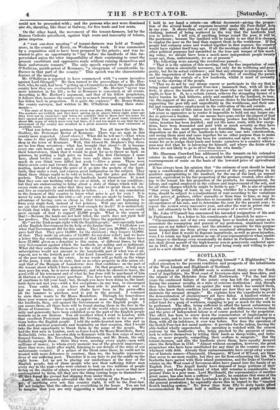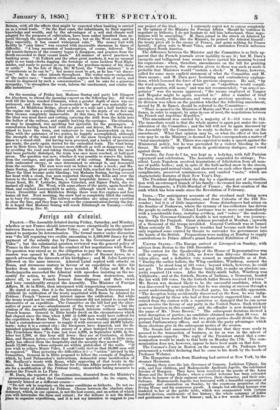SCOTLAND.
A correspondent of the Times, signing himself " A Highlander," has called attention to the present condition and prospects of the inhabitants of the West Islands and Highlands of Scotland.
A population of about 150,000 souls is scattered thinly over the North coast of Argyllshire, the West coast of Inverness-shire and Ross-shire, and the islands of the Hebrides from Mull Northwards. "For the last four years the continued failure of the potato crop has left the people, except during the summer months, in a state of extreme destitution ; and, though they have hitherto battled on against the want which has assailed them, those who know their condition best cannot see how they are any longer to maintain the unequal struggle." Ile explains how the expedients to avoid the demoralization of eleemosynary aid have failed. A landlord wishes to improve his estate by draining. "Ile applies to the administrators of the relief fund for a gang of workmen, engaging to pay so much for the work to be performed. The offer, being sufficient to afford the barest subsistence to the labourers employed in it, Is closed with, and the difference between that and the price of independent labour is of course pocketed by the proprietor. The effect has been to screw down the remuneration of employment to a famine scale, and to leave the whole population more wretched and hopeless than, with all its indolence, it ever was before. Nor does the operation of the Scotch Poor-law Act mend matters : it provides for the infirm, leaving the able-bodied wholly unprotected. Its operation is watched with the utmost jealousy by the kndlords; who, being. pinched by the payment of rates, seek to relieve themselves by letting their lands as sheep :walks; and indu- cing, or more properly, compelling, their crofters to emigrate. ' But the tenant-farmers, and also the landlords above them, have equally decayed since the Rebellion in 1745. "Almost without exception, however, the great proprietors who have been established for any time in the country are over- whelmed with debt. Already their embarrassments have swept away a num- ber of historic names—Clanranald, Glengarry, M'Leod of M'Leod, are those that occur to me most readily, but they are h.r from exhausting the list. The Seaforths have_parted with their island possessions, and the Duke of Gordon's estates on the West coast of Inverness-shire have passed into the hands of an English Peer. The Argyll family have disposed of large portions of their property ; and though the extent of what still remains is considerable, the present Duke is a poor man. Lord MacDonald, the representative of another great name, has also been a sufferer." Lastly, he considers that some of the expedients introduced from the Lowlands to give help have in fact added to the general prostration ; he especially shows this in regard to the "vaunted Scotch banking system." No fewer than from fifty to sixty banks afford accommodation for about half a million of the poorest people in Great Britain, with all the effects that might be expected when banking is carried on as a retail trade. " On the East coast, the inhabitants by their superior knowledge and wealth, and by the advantages of a soil and climate well adapted for the purposes of cultivation, have been rather benefited than in- jured through the operation of this system ; but on the West coast, and in Skye especially, it has caused widespread ruin." The money lent with facility m "easy times " was exacted with inexorable sternness in times of difficulty. " A long succession of bankruptcies, of course, followed. The old tenant-farmers of the country began to disappear, and graziers from the South succeeded to their vacant lands." All manner of novel practices in banking arose. "At Falkirk and the other great markets, it was no unusual sight to see bank-clerks dogging the footsteps of some luckless West High- lander, and ready to pounce at once upon the purchase-money of his sheep or cattle." In the Isle of Skye, Mr. M'Leod, the "bank emissary" is as "considerate as he can be" ; but money must be got, as he has "no discre- tion." So in the other islands throughout. The writer rejects emigration of the native race : "modern civilization aspires to the fusion of races, and would be disgraced by such a consummation" ; and he asks for a generous q-mpathy, " to strengthen the weak, inform the uneducated, and render the idle industrious."
On the morning of Friday last, Madame Sontag and party left Glasgow for Aberdeen, to attend the morning concert on the following day. All went well till the train reached Glarnmrs, when a greater of snow was ex-
perienced, and from thence to Laurencekirk the was materially re-
tarded. At Middleton Bridge, about a mile or a • e and a half farther on, the engine ran- into a cutting filled with snow to the depth of six feet and then became completely immoveable. At this time, five in the afternoon, the bleat was most fierce and cutting, carrying the drift from the fields into the hollow of the railway, and rapidly burying the• . The situation, as may be imagined, was anything but agreeable for e passengers. A consultation baying been held with the guard and driver, Mr. Wood deter- mined to leave the train, and endeavour to reach Laurencekirk on foot. This, with the assistance of two guides, he happily accomplished, although the strength of the wind and the depth of the snow brought them several times to a stand-still. Aid having been procured, and a basket of provisions got ready, the party again start.ed for the embedded train. The wind being now in their faces, the task became more difficult as well as dangerous ; but, by avoiding the road and taking through the fields, from which the snow had been partially dislodged, the train was once more reached, at half-past seven.- The question was now, whether it was possible to remove the ladies from the carriages, and gain the summit of the cutting. Madame Sontag, with undaunted energy, at once determined to attempt it, and descended from the carriage. The men were sent on before to make a track ; and Ma- dame Sontag, after great exertion and several falls, reached the level ground. There the blast became quite blinding; but Madame Sontag, having covered her head with a cloak, was soon supported through the fields and over the fences to the house of Mr. Wilson, a most hospitable farmer ; where, with Count Rossi, Mr. F. Lablache, Signor Calzolari, and Signor Piatti, she re- mained all night. Mr. Woody with some others of the party, again faced the blast, and reached Laureneekirk in safety, although much worn out. Be- tween Drumlithie and Middleton Bridge there were five engines and four trains all fast. Next morning, the snow had so completely filled the cutting as to bury the carriages. The railway authorities are using every exertion to clear the line, and they hope to restore the communication during the day. It is hoped that Madame Sontag will reach Edinburgh on Tuesday.—Cale- donian Mercury, Dec. 31.































 Previous page
Previous page